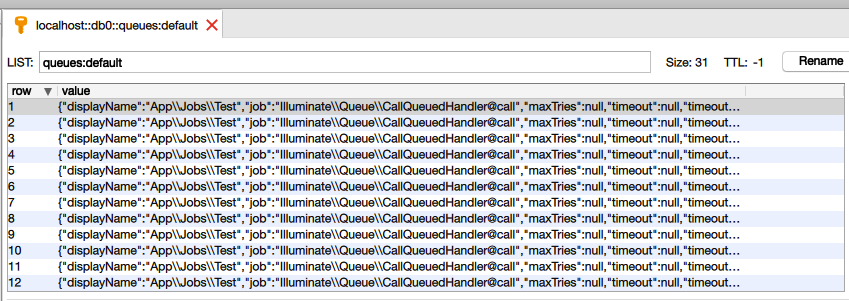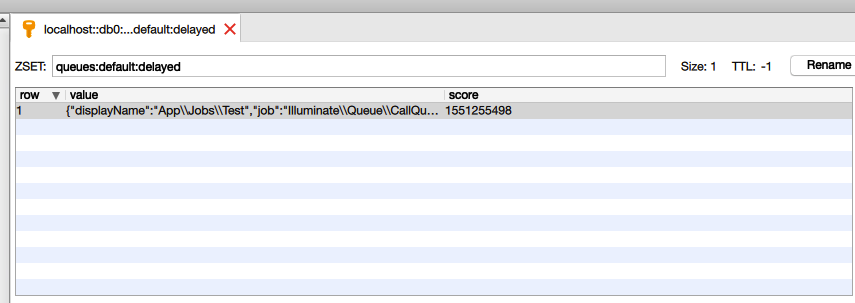任务的存储端
Job 的定义
<?php
namespace App\Jobs;
use Illuminate\Bus\Queueable;
use Illuminate\Queue\SerializesModels;
use Illuminate\Queue\InteractsWithQueue;
use Illuminate\Contracts\Queue\ShouldQueue;
use Illuminate\Foundation\Bus\Dispatchable;
class TestJob implements ShouldQueue
{
use Dispatchable, InteractsWithQueue, Queueable, SerializesModels;
public function __construct()
{
echo '开始构造Job';
}
public function handle()
{
echo '开始处理Job';
}
}
新建的 TestJob 类,这个类实现了序列化模型,队列功能等等都是通过trait类来补充的。
这些特性我们通过使用来分解。
运行一个任务
dispatch(new TestJob());
这里就是执行一个 TestJob 的任务,接下去看看 dispatch() 这个方法
function dispatch($job)
{
if ($job instanceof Closure) {
$job = new CallQueuedClosure(new SerializableClosure($job));
}
return new PendingDispatch($job);
}
这里会返回一个 Illuminate\Foundation\Bus\PendingDispatch 对象

TestJob 这个对象里面通过 use Queueable 引入的几个成员属性。
目前为止我们看到只不过是实例化了一个对象,同时将 TestJob 传给 PendingDispatch
我们来解读 PendingDispatch 这个类
<?php
namespace Illuminate\Foundation\Bus;
use Illuminate\Contracts\Bus\Dispatcher;
class PendingDispatch
{
protected $job;
public function __construct($job)
{
// "接收传入的 job 对象"
$this->job = $job;
}
public function onConnection($connection)
{
// "设置任务指定连接"
$this->job->onConnection($connection);
return $this;
}
public function onQueue($queue)
{
// "设置任务队列名"
$this->job->onQueue($queue);
return $this;
}
public function allOnConnection($connection)
{
// "设置工作链所有需要的连接"
$this->job->allOnConnection($connection);
return $this;
}
public function allOnQueue($queue)
{
// "设置工作链的队列"
$this->job->allOnQueue($queue);
return $this;
}
public function delay($delay)
{
// "设置延迟时间"
$this->job->delay($delay);
return $this;
}
public function chain($chain)
{
// "设置工作链任务"
$this->job->chain($chain);
return $this;
}
public function __destruct()
{
// "通过析构函数来转发job"
app(Dispatcher::class)->dispatch($this->job);
}
}
分解完这个类,其实大部分都是设置参数的过程,也是通过这些参数来控制任务的执行状态,比如延迟,工作链模式运行等等。
重点在析构函数,当运行完
return new PendingDispatch($job);之后对象如果没有被任何变量接收,那么对象的内存空间会被回收,从而触发析构函数执行,也是触发job继续执行的方式!
public function __destruct()
{
// "通过析构函数来转发job"
app(Dispatcher::class)->dispatch($this->job);
}
获取任务对应的解析器
app(Dispatcher::class) 传入的参数是 Illuminate\Bus\Dispatcher ,
这个契约对应的绑定类是通过配置文件 app.providers.Illuminate\Bus\BusServiceProvider::class 来加载的
关于 provider 的启动在第九章中有讲,我们直接看启动方法
public function register()
{
$this->app->singleton(Dispatcher::class, function ($app) {
return new Dispatcher($app, function ($connection = null) use ($app) {
return $app[QueueFactoryContract::class]->connection($connection);
});
});
$this->app->alias(
Dispatcher::class, DispatcherContract::class
);
$this->app->alias(
Dispatcher::class, QueueingDispatcherContract::class
);
}
app(Dispatcher::class) 的实质就是这个闭包的返回
function ($app) {
return new Dispatcher($app, function ($connection = null) use ($app) {
return $app[QueueFactoryContract::class]->connection($connection);
});
}
看看 Dispatcher 构造函数
public function __construct(Container $container, Closure $queueResolver = null)
{
$this->container = $container;
$this->queueResolver = $queueResolver;
$this->pipeline = new Pipeline($container);
}
接受两个参数,第一个是容器,第二个就是闭包所以 $this->queueResolver 就是
function ($connection = null) use ($app) {
return $app[QueueFactoryContract::class]->connection($connection);
}
我管这个 $this->queueResolver 叫解析器,作用是接收一个 $connection 然后从容器中解析出队列的驱动并进行连接。
QueueFactoryContract::class 是通过 provider 加载的
位于 app.providers.Illuminate\Queue\QueueServiceProvider::class,
返回的对象是 Illuminate\Queue\QueueManager 由于 'default' => env('QUEUE_CONNECTION', 'sync'),
中配置的 redis 所以最后返回的对象是 Illuminate\Queue\RedisQueue
分发任务到队列
public function dispatch($command)
{
// "$this->queueResolver 这个队列解析器是在构造的时候注入的"
if ($this->queueResolver && $this->commandShouldBeQueued($command)) {
return $this->dispatchToQueue($command);
}
return $this->dispatchNow($command);
}
上面的方法明确了任务是该通过队列还是同步执行。
这里我们看,传入的 $command 就是开始的 TestJob 对象。
还记得 Laravel 文档说的如果要通过队列实现需要实现一个指定的接口吗
implements ShouldQueue,这段代码就是解释了原因。
protected function commandShouldBeQueued($command)
{
return $command instanceof ShouldQueue;
}
继续下去,通过上面的判断之后我们进入 dispatchToQueue($command) 这里
public function dispatchToQueue($command)
{
$connection = $command->connection ?? null;
$queue = call_user_func($this->queueResolver, $connection);
if (! $queue instanceof Queue) {
throw new RuntimeException('Queue resolver did not return a Queue implementation.');
}
if (method_exists($command, 'queue')) {
return $command->queue($queue, $command);
}
return $this->pushCommandToQueue($queue, $command);
}
上面解析过了 $queue 就是 Illuminate\Queue\RedisQueue 这个对象
// "返回 false"
if (method_exists($command, 'queue')) {
return $command->queue($queue, $command);
}
所有最后执行了 return $this->pushCommandToQueue($queue, $command);
protected function pushCommandToQueue($queue, $command)
{
// "如果存在指定的队列和延迟,则推入指定队列+延迟"
if (isset($command->queue, $command->delay)) {
return $queue->laterOn($command->queue, $command->delay, $command);
}
// "如果存在指定的队列则push到指定的队列"
if (isset($command->queue)) {
return $queue->pushOn($command->queue, $command);
}
// "只存在延迟设置,推入延迟"
if (isset($command->delay)) {
return $queue->later($command->delay, $command);
}
// "默认"
return $queue->push($command);
}
构造数据
上面已经到了最终的调用,那么接下来的事情就是构造一个什么样格式的数据存入
redis
追踪 $queue->push($command)
// "这里的 $job 就是最开始传入的 TestJob 对象!"
public function push($job, $data = '', $queue = null)
{
return $this->pushRaw($this->createPayload($job, $this->getQueue($queue), $data), $queue);
}
构造 payload
protected function createPayload($job, $queue, $data = '')
{
$payload = json_encode($this->createPayloadArray($job, $queue, $data));
if (JSON_ERROR_NONE !== json_last_error()) {
throw new InvalidPayloadException(
'Unable to JSON encode payload. Error code: '.json_last_error()
);
}
return $payload;
}
这里的 createPayloadArray() 先调用Illuminate\Queue\RedisQueue对象的
protected function createPayloadArray($job, $queue, $data = '')
{
return array_merge(parent::createPayloadArray($job, $queue, $data), [
'id' => $this->getRandomId(),
'attempts' => 0,
]);
}
追踪父类Illuminate\Queue\Queue 方法
protected function createPayloadArray($job, $queue, $data = '')
{
return is_object($job)
? $this->createObjectPayload($job, $queue)
: $this->createStringPayload($job, $queue, $data);
}
// "$job 是对象的时候格式化方式"
protected function createObjectPayload($job, $queue)
{
$payload = $this->withCreatePayloadHooks($queue, [
'displayName' => $this->getDisplayName($job),
'job' => 'Illuminate\Queue\CallQueuedHandler@call',
'maxTries' => $job->tries ?? null, // "这是任务设置的重试次数"
'timeout' => $job->timeout ?? null, // "这是超时时间"
'timeoutAt' => $this->getJobExpiration($job), // "获取处理过期时间"
'data' => [
'commandName' => $job,
'command' => $job,
],
]);
return array_merge($payload, [
'data' => [
'commandName' => get_class($job),
'command' => serialize(clone $job),
// "序列化,这里的序列化会调用
SerializesModels 特质类的__sleep()方法
在开头的时候所有的 Job 类都有use"
],
]);
}
// "$job 是字符串的时候格式化方式"
protected function createStringPayload($job, $queue, $data)
{
return $this->withCreatePayloadHooks($queue, [
'displayName' => is_string($job) ? explode('@', $job)[0] : null,
'job' => $job,
'maxTries' => null,
'timeout' => null,
'data' => $data,
]);
}
将获取的最后 json 字符串 rpush 到 redis 中。
public function pushRaw($payload, $queue = null, array $options = [])
{
$this->getConnection()->rpush($this->getQueue($queue), $payload);
return json_decode($payload, true)['id'] ?? null;
}

return $queue->later($command->delay, $command);,
逻辑基本上一样,只不过最后存入的队列是名不一样

小结
到这里位置关于任务和队列的应用写入端口已经完成,最终是把指定的格式的数据存入配置的存储驱动中的过程。